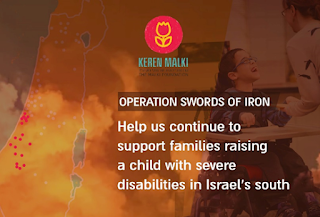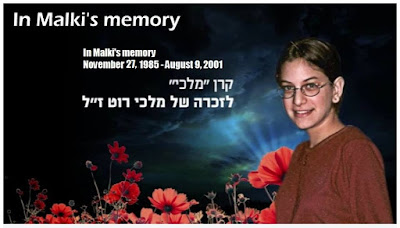 |
Screen shot from tomorrow's Jerusalem Post Magazine
Click here for a PDF of the two-page article as printed |
In Thursday's Jerusalem Post Magazine (April 9, 2015), there's going to be an article in the paper's occasional
Wine Therapy section under the heading "
A meaningful life". It's an interview with Malki Foundation co-founder,
Arnold Roth, that examines the factors that led to the organization's chosen direction and its approach to the population it seeks to serve. (And for those wondering what this has to do with wine or restaurants, we're with you.)
Thursday being the eve of the la
st festival days of Passover, the story went up online today, Wednesday (but it's behind the JPost.com paywall) here.
Click here for a PDF of the article as printed.
Following is a modified text version of the online article.
Wine Therapy: A meaningful life | YOAV SCHWARTZ, ASAF FINKELSTEIN | Jerusalem Post | April 8, 2015
Goal: To discover the personal story behind the Malki Foundation
It’s 2001: the Second
Intifada. Terrorism is rampant, striking at Israelis across the country.
Jerusalem is firmly in the sights of the terrorists who carry out atrocities that
remain etched in Israeli consciousness. One was the human-bomb attack on central
Jerusalem’s Sbarro pizzeria.
Minutes before the explosion,
Malki Roth, 15, and her best friend Michal Raziel, enter and place their lunch
order at the counter. The powerful bomb and the terrorists’ determination to
kill as many Jews as possible gave them no chance. It cut short Malki’s young life and horrified
an entire nation.
While the attack was
celebrated with dancing in Arab villages, Malki’s family being creating a
foundation in her name. Their goal: to provide support for children with special
needs and their families on a non-sectarian basis.
Thirteen years later,
we sat with Malki’s father, Arnold Roth, to learn more about the foundation whose
work positively impacts thousands of families.
Interviewer: Tell us about
Malki. What sort of girl was she?
Arnold Roth: Malki was born in
Melbourne, Australia. She was two when we made aliya. It’s human nature to speak
of the departed as being wonderful. But whoever knew Malki was aware of her beautiful,
constant smile. She was always doing something constructive for others. This was especially
clear in how she cared for her youngest sister, Haya, who is nearly 20 now and profoundly
affected by disabilities. Malki was just 11 when her little sister’s tremendous
challenges emerged.
Were they close?
Yes though the
relationship was not symmetrical. Haya’s disabilities meant she gave no visible
response to the deep love and affection that Malki showed her. Malki had a rare
sensitivity to other people that was rich in insight and empathy – something rare
in a person so young. By the summer of
2001, when she and a friend volunteered at the Etgarim camp for children with
cognitive disabilities, Malki had acquired a substantial resume of volunteer
work with special-needs children. Malki’s compassion and zest for life were
exemplary and moving. That’s the legacy she bequeathed to us.
When did you decide to establish the Malki Foundation?
That was during the seven days of mourning –
the Shiva. As a family, we wanted to ensure Malki’s beautiful life would not be
forgotten - that it would not become a mere
statistic. As the family of a child with profound
disabilities, we knew how hard that can be. We decided to create a small, very
focused organization, that would help other families achieve more and get disheartened
less. We filed the formation papers right
after the Shiva, and received the certificate of Keren Malki’s establishment on
September 11, 2001. That was the same day that we held an Azkara, marking 30 days
after the murders of the two neighbourhood girls, Malki and Michal. That date,
of course, is now better known as 9/11.
Why choose to
support families of special needs children?
My wife and I had
been pushing back for some years against some very disappointing aspects of
Israel’s health-care system. It seemed the very last thing the insurance
companies and government ministries cared about was our youngest daughter’s
future. Malki’s murder brought about a subtle change in our approach. We
realized the system would never change as fast as we wanted. Fighting it would
take energy we no longer had. Instead, we started building a detour – a by-pass
road – to allow families like ours to avoid confrontations but still get what
they and their special-needs child need.
It takes courage
to try and replace the state in this role
We make very sure
that Keren Malki’s work augments, and never duplicates or replaces,
what government ministries and the health funds do. Despite its tremendous
achievements, Israel does not yet do tremendous things for its children with
special needs. It does much less than it could and should. Things will get
better.
How do you bring
about change?
When we were first told
by so-called experts that it would be best for our year-old daughter and us to
hand our child off to institutional care, we knew something was wrong with a system
that devalued the parents’ role. In creating the Malki Foundation, we saw two
key things that would empower the family and allow them to keep the child at
home as long as possible.
One: provide them
with essential home-care equipment like special chairs and walkers. We asked the
Yad Sarah Organization to partner with us in this. It has worked wonderfully
well.
The second: Enable
easier access to the paramedical treatments that are essential for a child’s
development. We passed the 40,000 therapy sessions
mark a while ago. Every one of those sessions could not have happened if
it were up to the health funds or the government alone. The families who
benefit can tell you about the positive impact those therapy sessions are
having.
And your personal
role?
We felt this new
charity should not become our parnassah, a source of income for us. We
had seen too many worthy causes that turned into family businesses and wanted
to avoid the conflicts that inevitably follow. Frimet and I are volunteer
advisers and board members at Keren Malki. The real work gets done by dedicated
staff professionals.
How does it work
in practice?
In our Therapies
at Home program, the family decides which non-medical therapies, how many,
when and selects the therapists. Families who are sometimes infantilized by
their dealings with officials are empowered by the support of the Malki
Foundation. And empowerment, as we have learned, is a key ingredient in getting
great results.
We have a second
therapies program that’s specifically for families in the northern and southern
periphery of this long, narrow country. Too often, we could give them a blank
cheque but they could not spend it. They live too far from where the therapists
are. So we have done what we wish the government would do: send physical,
occupational and speech therapists into their homes under expert
supervision. The inspiration and seed funding for the Zlata Hersch Memorial
Therapists on Wheels Program came from a remarkable Jerusalem family who
have asked that their names remain private.
Here’s an example. A
severely disabled boy of seventeen was released from long-term hospital care to
his home in a Negev community. Back in Jerusalem for his annual clinical review,
the parents were asked why there seemed to be little progress. Answer: there
were no accessible therapists in their vicinity and driving their son to far-away
treatments was overwhelming. It’s just one instance, but even telling it makes
my blood boil. A totally avoidable problem.
How so? Their town
is in the remote periphery.
Ours is not a banana
republic with third-world expectations. This is Israel where the values are proudly
Jewish and the expectations are state-of-the-art. In the case of that
young man, the Malki Foundation, with our limited donor-funded resources, intervened.
The outcome is as you might expect, heart-warming and positive.
We all know the
government and the “system” ought to be thinking the way we do. Perhaps one day
it will.
You sound critical…
Both as a parent and
as someone passionate about the foundation, I am certain that things can and
must get much better. Empowering parents does not happen enough. Parents are
among the child’s main advocates and agents of change. Ignoring them and their
contribution happens more than the authorities seem to realize. It’s a
self-defeating mistake.
Why did you choose
to support these families specifically through therapy?
After more than a
decade of activity, we know how often a parent’s request for support is
answered with a bureaucrat’s “no”. It’s
deeply satisfying to me whenever Keren Malki steps in to say “yes”.
The Malki
Foundation seems unlike some other organizations in the non-profit sector in
that you don’t leverage your success for fund-raising and you don’t use
personal stories very much. Whoever is familiar with the world of Israeli
non-profits knows this is a rather unusual way of operating.
My wife and I, as parents
of a special needs child, often feel condescended to by the system. We are
determined that the families helped by the Malki Foundation’s work don’t get
that treatment from us. We keep a respectful distance and respect their privacy.
But human nature being what it is, sometimes families who have gotten support
push hard for the right to help us tell our story.
Can you share an
instance?
There’s one family
who have endeared themselves to us in special ways. Triplets were born. Two
were fine; one had severe challenges, beyond words. The mother, a fantastic
advocate for her own family, today talks about how the doctors said she should abandon
the special child and focus on the others. I believe the word ‘vegetable’
was used. She and her husband chose to ignore the ‘advice’. The tiny child with huge challenges came home after
his siblings, and the family embarked on a mission to give every kind of
non-medical treatment that could enable him to achieve his potential. This, not
surprisingly, brought them to the brink of insolvency and the pressures that
come with that.
What was the
outcome?
The Malki Foundation
got involved via our Therapies at Home program. Fast forward: that little boy
is now a beautiful, energetic young fellow who does pretty much what other
children of his age do. His parents are an absolute inspiration, but the system
let them down. Had matters run their course and the family accepted it, the
outcome might have been much less happy.
It’s incredible
that Ahlam Tamimi, the terrorist who masterminded the Sbarro pizzeria killings and
bought the human bomb to the center of Jerusalem, was freed from prison in the
Shalit exchange and has become a celebrity in Jordan while she continues even now
advocating for the murder of more Israelis.
Many hundreds of Arab
families have benefitted from the services of the Malki Foundation. There is no
political aspect to its work, which is the way most Israeli institutions
operate even if people far from here believe the opposite. The foundation operates
on a strictly non-sectarian, politics-free basis.
When I think of the
hatred that motivates Malki’s murderers up until today, and then of the
constructive things done in her memory, I no longer pay attention to such journalistic
clichés as “two sides of the coin”. For me, our side is symbolized by a fifteen
year-old girl who, if she had been spared to live a full life, would probably
laugh off the silliness of politicians and look around for more good, helpful
things to do.
Final word?
Malki wrote a song.
It’s on the foundation’s website. I often speak to schools when I travel. Almost
every time, a student or two will come up afterwards and tell me my daughter’s
music is on their smartphone or portable device. Knowing that Malki’s music is
out there, spreading optimism, is satisfying beyond words.





















